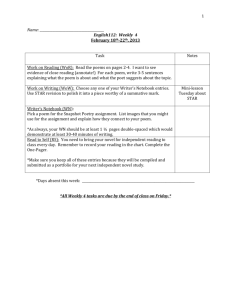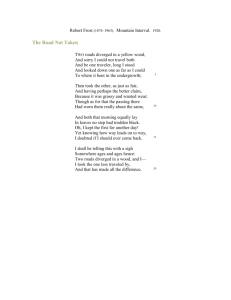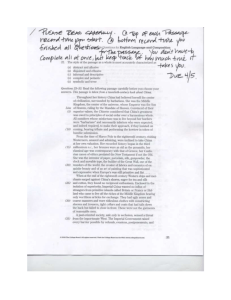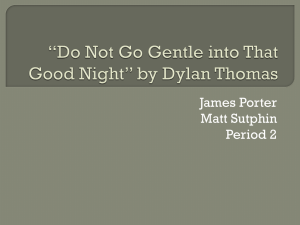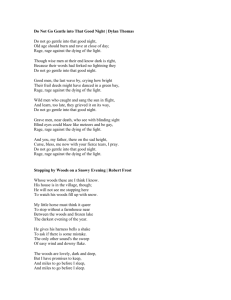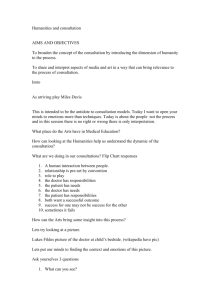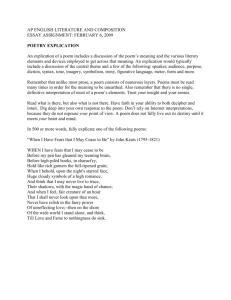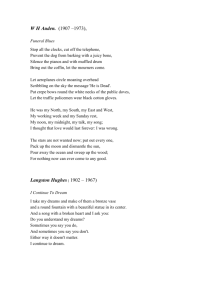MODERN ERA packet
advertisement
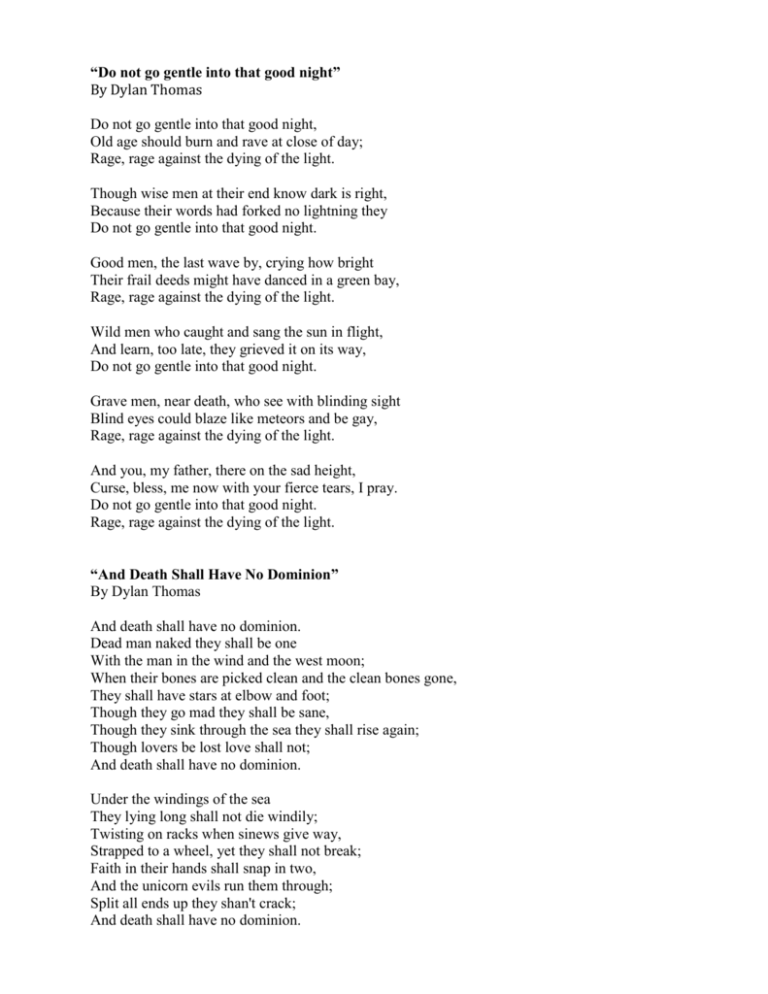
“Do not go gentle into that good night” By Dylan Thomas Do not go gentle into that good night, Old age should burn and rave at close of day; Rage, rage against the dying of the light. Though wise men at their end know dark is right, Because their words had forked no lightning they Do not go gentle into that good night. Good men, the last wave by, crying how bright Their frail deeds might have danced in a green bay, Rage, rage against the dying of the light. Wild men who caught and sang the sun in flight, And learn, too late, they grieved it on its way, Do not go gentle into that good night. Grave men, near death, who see with blinding sight Blind eyes could blaze like meteors and be gay, Rage, rage against the dying of the light. And you, my father, there on the sad height, Curse, bless, me now with your fierce tears, I pray. Do not go gentle into that good night. Rage, rage against the dying of the light. “And Death Shall Have No Dominion” By Dylan Thomas And death shall have no dominion. Dead man naked they shall be one With the man in the wind and the west moon; When their bones are picked clean and the clean bones gone, They shall have stars at elbow and foot; Though they go mad they shall be sane, Though they sink through the sea they shall rise again; Though lovers be lost love shall not; And death shall have no dominion. Under the windings of the sea They lying long shall not die windily; Twisting on racks when sinews give way, Strapped to a wheel, yet they shall not break; Faith in their hands shall snap in two, And the unicorn evils run them through; Split all ends up they shan't crack; And death shall have no dominion. No more may gulls cry at their ears Or waves break loud on the seashores; Where blew a flower may a flower no more Lift its head to the blows of the rain; Though they be mad and dead as nails, Heads of the characters hammer through daisies; Break in the sun till the sun breaks down, And death shall have no dominion. “The Rose of Battle” By William Butler Yeats Rose of all Roses, Rose of all the World! The tall thought-woven sails, that flap unfurled Above the tide of hours, trouble the air, And God's bell buoyed to be the water's care; 5 While hushed from fear, or loud with hope, a band With blown, spray-dabbled hair gather at hand. Turn if you may from battles never done, I call, as they go by me one by one, Danger no refuge holds, and war no peace, 10 For him who hears love sing and never cease, Beside her clean-swept hearth, her quiet shade: But gather all for whom no love hath made A woven silence, or but came to cast A song into the air, and singing passed 15 To smile on the pale dawn; and gather you Who have sougft more than is in rain or dew, Or in the sun and moon, or on the earth, Or sighs amid the wandering, starry mirth, Or comes in laughter from the sea's sad lips, 20 And wage God's battles in the long grey ships. The sad, the lonely, the insatiable, To these Old Night shall all her mystery tell; God's bell has claimed them by the little cry Of their sad hearts, that may not live nor die. 25 Rose of all Roses, Rose of all the World! You, too, have come where the dim tides are hurled Upon the wharves of sorrow, and heard ring The bell that calls us on; the sweet far thing. Beauty grown sad with its eternity 30 Made you of us, and of the dim grey sea. Our long ships loose thought-woven sails and wait, For God has bid them share an equal fate; And when at last, defeated in His wars, They have gone down under the same white stars, 35 We shall no longer hear the little cry Of our sad hearts, that may not live nor die. “Sailing to Byzantium” By William Butler Yeats I That is no country for old men. The young In one another's arms, birds in the trees, — Those dying generations — at their song, The salmon-falls, the mackerel-crowded seas, 5Fish, flesh, or fowl, commend all summer long Whatever is begotten, born, and dies. Caught in that sensual music all neglect Monuments of unageing intellect. II An aged man is but a paltry thing, 10A tattered coat upon a stick, unless Soul clap its hands and sing, and louder sing For every tatter in its mortal dress, Nor is there singing school but studying Monuments of its own magnificence; 15And therefore I have sailed the seas and come To the holy city of Byzantium. III O sages standing in God's holy fire As in the gold mosaic of a wall, Come from the holy fire, perne in a gyre, 20And be the singing-masters of my soul. Consume my heart away; sick with desire And fastened to a dying animal It knows not what it is; and gather me Into the artifice of eternity. IV 25Once out of nature I shall never take My bodily form from any natural thing, But such a form as Grecian goldsmiths make Of hammered gold and gold enamelling To keep a drowsy Emperor awake; 30Or set upon a golden bough to sing To lords and ladies of Byzantium Of what is past, or passing, or to come. “The Triumph of the Machine” By D.H. Lawrence They talk of the triumph of the machine, but the machine will never triumph. Out of the thousands and thousands of centuries of man the unrolling of ferns, white tongues of the acanthus lapping at the sun, 5 for one sad century machines have triumphed, rolled us hither and thither, shaking the lark's nest till the eggs have broken. Shaken the marshes, till the geese have gone and the wild swans flown away singing the swan-song at us. 10 Hard, hard on the earth the machines are rolling, but through some hearts they will never roll. The lark nests in his heart and the white swan swims in the marshes of his loins, and through the wide prairies of his breast a young bull herds his cows, 15 lambs frisk among the daisies of his brain. And at last all these creatures that cannot die, driven back into the uttermost corners of the soul, will send up the wild cry of despair. 20 The thrilling lark in a wild despair will trill down arrows from the sky, the swan will beat the waters in rage, white rage of an enraged swan, even the lambs will stretch forth their necks like serpents, like snakes of hate, against the man in the machine: even the shaking white poplar will dazzle like splinters of glass against him. 25 And against this inward revolt of the native creatures of the soul mechanical man, in triumph seated upon the seat of his machine will be powerless, for no engine can reach into the marshes and depths of a man. So mechanical man in triumph seated upon the seat of his machine will be driven mad from within himself, and sightless, and on that day 30 the machines will turn to run into one another traffic will tangle up in a long-drawn-out crash of collision and engines will rush at the solid houses, the edifice of our life will rock in the shock of the mad machine, and the house will come down. Then, far beyond the ruin, in the far, in the ultimate, remote places 35 the swan will lift up again his flattened, smitten head and look round, and rise, and on the great vaults of his wings will sweep round and up to greet the sun with a silky glitter of a new day and the lark will follow trilling, angerless again, and the lambs will bite off the heads of the daisies for very friskiness. 40 But over the middle of the earth will be the smoky ruin of iron the triumph of the machine. “Phoenix” By D.H. Lawrence Are you willing to be sponged out, erased, cancelled, made nothing? Are you willing to be made nothing? dipped into oblivion? If not, you will never really change. The phoenix renews her youth only when she is burnt, burnt alive, burnt down to hot and flocculent ash. Then the small stirring of a new small bub in the nest with strands of down like floating ash shows that she is renewing her youth like the eagle, immortal bird. “Troth with the Dead” By D.H. Lawrence The moon is broken in twain, and half a moon Beyond me lies on the low, still floor of the sky; The other half of the broken coin of troth Is buried away in the dark, where the dead all lie. They buried her half in the grave when they laid her away; Pushed gently away and hidden in the thick of her hair Where it gathered towards the plait, on that very last day; And like a moon unshowing it must still shine there So half lies on the sky, for a general sign Of the troth with the dead that we are pledged to keep; Turning its broken edge to the dark, it shine Ends like a broken love, that turns to the dark of sleep. And half lies there in the dark where the dead all lie Lost and yet still connected; and between the two Strange beams must travel still, for I feel that I Am lit beneath my heart with a half-moon, weird and blue.
